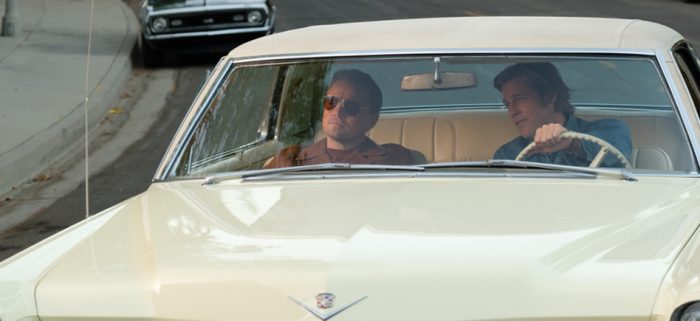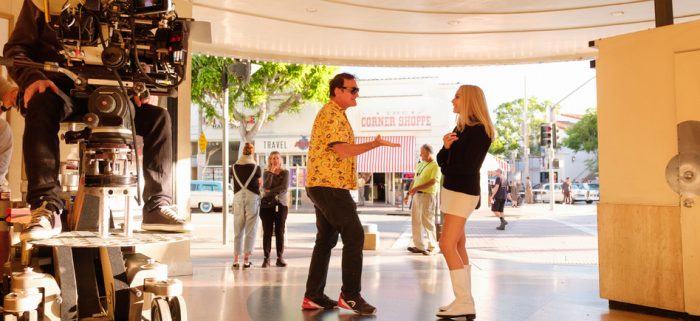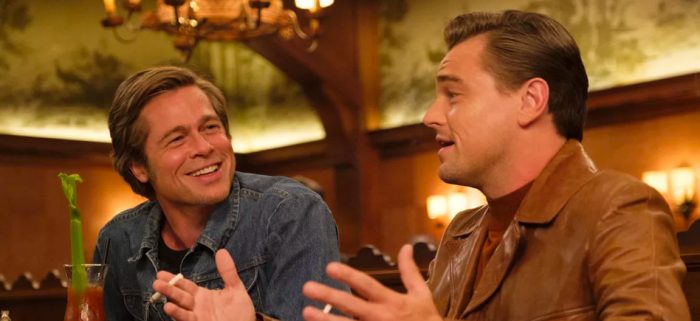‘Once Upon a Time in Hollywood’ Spoiler Review: Quentin Tarantino’s Funny, Melancholy Masterwork
Who could’ve guessed that Once Upon a Time in Hollywood, once thought of as “Quentin Tarantino‘s Charles Manson movie”, would end up being one of the sweetest films of the director’s career? Beneath the rampant speculation, beneath the True Crime trappings, beneath the bursts of shockingly graphic violence, Once Upon a Time in Hollywood has a warm, loving heart.
It’s a melancholy film – a film about endings, and beginnings. It’s about living your dreams, and realizing that sometimes those dreams aren’t enough – and then learning to accept that. You may be doing what you love, but you might still not be where you want to be. And maybe that’s okay, as long as you have someone to share it all with. It’s a fairytale. A question of “What if…?” writ large on celluloid. And it’s a masterpiece.
The rest of this article contains major spoilers.
I Wished I Could Save Her in Some Sort of Time Machine
At some point, history turned Sharon Tate into a statistic. A footnote mentioned in conjunction with Charles Manson and his murderous “family.” But Tate, whose brutal murder looms over the sunshine of Once Upon a Time in Hollywood like gathering storm clouds, was and is more than just a Manson Family victim. She was a flesh and blood person – someone who lived and loved and was loved in return. Someone who was cruelly cut down in the prime of her life, while pregnant with her first child. What happened to Sharon Tate on August 9, 1969, was an outrage. And the outrage only continued as time and history reduced her into little more than the stuff of True Crime books.
Once Upon a Time in Hollywood wants to right that wrong. Tarantino is looking at Tate’s murder, and the murder of her friends who were unlucky enough to be in the house with her when the Manson Family came calling and saying “No.” He’s rewriting history, just as he did in Inglorious Basterds. He’s saying, “Well, this didn’t happen – but it should have happened.”
Here, Tarantino is like Dale Cooper in David Lynch’s Twin Peaks: The Return managing to bend time and space and rescue Palmer from her murder. Or like Neutral Milk Hotel frontman Jeff Mangum crafting In the Aeroplane Over the Sea around the fantastical idea of rescuing Anne Frank – “I wished I could save her in some sort of time machine,” he sings on “Oh Comely.” Like the doomed heroines of Twin Peaks and “Aeroplane Over the Sea”, Once Upon a Time in Hollywood, and by extension writer-director Tarantino, views Tate’s death as a cosmic wrong worth righting.
As a result, Tate is not just a character in Hollywood. She’s also an ideal – an ethereal presence, the physical embodiment of the old school Hollywood cool Tarantino fetishizes unabashedly. “She’s flesh and blood, but she’s also an idea,” he told Time Magazine.
With all this talk and focus on Tate, you might go into Tarantino’s latest thinking she’s a major part of the film. But she’s not – at least not technically speaking. While Tate and her fate are a driving factor of the film, and the actress, played with warm, bubbly grace by Margot Robbie, is glimpsed several times throughout the course of the movie, she’s only the focus of one scene. And what a scene it is.
Robert Richardson’s camera follows Robbie as Tate as she goes about her day in Los Angeles. She picks up a hitch-hiker. She drives fast with the windows down, her golden hair billowing. She purchases a copy of Tess of the D’Urbervilles for her husband, Roman Polanski. And she goes to the movies. And not just any movie – her movie. While out and about she notices a theater showing The Wrecking Crew, the 1968 Matt Helm spy comedy starring Dean Martin. The price of a ticket is alarmingly low, and Sharon likely has more than enough money to buy her way into the theater. But she takes a risk, and asks: “What if you’re in the movie?” The theater staff is amused and surprised, if not exactly star struck – they don’t really know who she is until she mentions her part in Valley of the Dolls. But the gamble pays off, and Sharon is invited into the theater for free.
She dances her way to her seat as trailer music plays, and before long, she’s watching herself on the silver screen. Except, Robbie is actually watching the real Sharon Tate. Tarantino could’ve re-shot Tate’s scenes with Robbie, but he instead chose to keep them as-is. This could’ve backfired: Robbie looks like Tate, but she’s not identical to the late actress. And showing the real deal and then immediately cutting to her modern-day stand-in has the potential to be jarring. But it works and lends an extra surreal, lovely quality to it all. Robbie is watching Tate, just as we are watching Robbie-as-Tate, and the past and the present are colliding before us in some sort of strange alchemy.
Tarantino gets a lot of criticism (some of it justified) for his brutality, but this one moment is so sweet, so tender, so charming, that it suggests that deep down, he’s a bit of a softie. Sharon nervously listens to the audience whenever her character does something funny – and she’s delighted to hear the crowd laughing along with her. Robbie’s performance in this scene is perfection – the actress nails the excitement and the trepidation. We can practically feel the butterflies in her stomach. It’s movie magic. As magical as a scene late in the film when one by one, we watch the neon signs of bars, fast food joints and of course, movie theaters, come flickering on – humming, buzzing, alive. Here, Sharon Tate lives again – even though she doesn’t. She’s flesh and blood, but she’s also an idea.
More Than a Brother, and a Little Less Than a Wife
Sharon Tate and the Manson Family are fixtures in Once Upon a Time in Hollywood, but the people the film is most preoccupied with are washed-up actor Rick Dalton (Leonardo DiCaprio) and his longtime stuntman Cliff Booth (Brad Pitt). The two are close in ways only truly great friends can be, to the point where they’re more or less a couple. They get together to drink and laugh and crack jokes while watching Rick’s guest stint on FBI. They complement each other, both despite and because of their differences. Rick is needy, whiny even; terrified of being a failure. Cliff, meanwhile, is cool and carefree, and apparently good at everything. He’s the one who projects the air of a movie star, while Rick seems like the type of person who should be hanging back.
But the opposite. While he’s technically a stuntman, Cliff does very little stunt work. Instead, he primarily does odd jobs for Rick. He drives him around; he picks up stuff for him; he’s there whenever he’s needed, like a denim-clad butler. Like Rick, his career in showbiz is on the skids, and for a potentially good reason: word around town is that Cliff murdered his wife. Once Upon a Time in Hollywood gives us a quick flashback to this, and never states one way or another what happened. There’s a chance the death was accidental. There’s also a chance it wasn’t. This moral ambiguity hangs over Cliff and colors him in darker tones. But Pitt is so likable; so cool; and yes, so god damn handsome, that it’s very easy to fall under Cliff’s sway. It certainly doesn’t hurt that Cliff has a cute dog: a huge, lovable, scene-stealing pit bull named Brandy.
While Cliff zooms around LA in his car at dangerous speeds, taking breaks to effortlessly leap up onto rooftops like a damn ninja, Rick spirals down the drain. He’s a star in the sense that people know his name, but he’s not where he thought he’d be. At the start of the film, he meets with super-agent Marvin Schwarzs (Al Pacino, in a brief but wonderful part), who basically tells Rick that he’s become nothing more than a punchline. Marvin thinks he has the solution: Rick should go to Italy and make spaghetti Westerns. But Rick would rather die. He doesn’t want to be an Italian movie star. He wants to belong solely to Hollywood.
He’s still booking parts. He’s landing tons of guest roles on TV shows – usually as cowboys, since it was a cowboy TV show (Bounty Law) that made him famous. But to what end? He can learn his lines, but more often than not, he drinks himself into a stupor and blows them. While on the set of Lancer, he has something of an existential crisis. First, the director, Sam Wanamaker (Nicholas Hammond), buries Rick in make-up. “I hired you to be an actor, not a TV cowboy,” he tells a befuddled Rick. Then, Rick breaks down crying while conversing with a far more professional co-star…who is also a child (played to perfection by young actress actor Julia Butters).
Tarantino goes all-in on this sequence, recreating entire scenes of Lancer and putting us in the director’s chair, so to speak. We get to watch Rick work…and fail. And berate himself. And retreat to his trailer where he has a complete meltdown. But then, something miraculous: he gets his shit together. He goes back to set and knocks a scene out of the park. “That was the greatest acting I’ve ever seen,” his young co-star tells him, and he breaks down in gratitude. This entire moment could’ve been completely played for laughs – and indeed, it’s quite funny. DiCaprio earns a lot of laughs from his work in the film – he’s more of the comic relief than the leading man. But DiCaprio also takes things a step further. He brings a wounded innocence to Rick, enabling us to empathize with him. And when his co-star pays him a compliment, we’re happy for him.
It becomes apparent in these long stretches where Rick and Cliff sit around and shoot the shit that Tarantino loves these characters, perhaps more than he’s loved any of his characters in the past. Once Upon a Time in Hollywood is short on plot – and that’s perfectly fine. In fact, it’s by design. “I had a situation where I thought, We don’t need a story,” he said. “They’re the story. Let’s just have a day in the life of these characters.”
We follow Rick and Cliff through Hollywood and beyond, and we grow accustomed to them, just as they’ve long grown accustomed to each other. The friendship between these two is what drives Hollywood, and DiCaprio and Pitt are absolutely electric together. We grow so enamored with them that when the film grinds to a stop and announces that they’re about to part ways, we’re heartbroken.
Rick has gotten married, and can no longer afford to pay Cliff. As a result, they’re breaking up the way a long-married couple might – with sadness, with regret, but also with a wistfulness reflecting on the past, and thinking about the future. They plan to get blind drunk together one last time at Rick’s place – which is right next door to the house occupied by Sharon Tate. And wouldn’t you know it? The big night of the breakup just happens to be August 9, 1969.
Continue Reading Once Upon a Time in Hollywood >>
The post ‘Once Upon a Time in Hollywood’ Spoiler Review: Quentin Tarantino’s Funny, Melancholy Masterwork appeared first on /Film.
from /Film https://ift.tt/2SLrjiG



No comments: